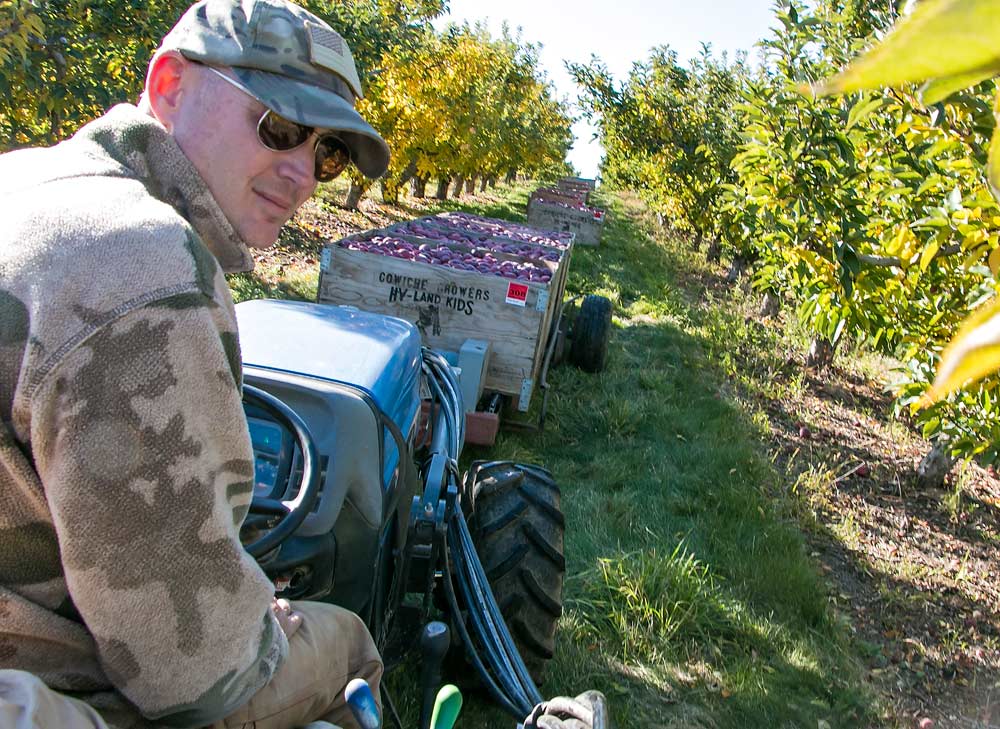
Chuck Turner of Cowiche steers bins of Red Delicious apples in October en route to packing at Cowiche Growers, a fruit cooperative. Turner, a fourth-generation grower, likes the voice a cooperative membership gives him and is now running for board position at the company. (Ross Courtney/Good Fruit Grower)
Chuck Turner’s grandfather was a member of the Cowiche Growers cooperative. So was his father. The family has tried other places over the years but the 39-year-old grower plans to stay.
Turner, a fourth-generation farmer with 240 acres of apples, pears and cherries in the hills west of Yakima, Washington, guesses he could fetch higher prices at privately owned packers but doesn’t want to yield his voice as a grower-owner of the packing facility. In fact, he’s running for a position on the board of directors.
“We have an actual vested interest in the company,” he said.
Cowiche Growers is one of about a half-dozen cooperative packers left in Washington — an industry segment that’s followed a similar trend toward consolidation as packers overall. But the cooperative model still plays a relevant role in the industry in a populist era for those who distrust big institutions.
Though prevented by law from making a long-term profit, cooperatives may hang onto a portion of their revenue above sales for operation and investment capital to keep up with changing technology in packing lines, hire workers, maintain equipment and perform all the duties that any packing facility would.
However, they are obligated to return those profits to the grower someday, often on a cycle called “revolving” payments, typically between three and 20 years. The grower members get to vote on those issues each year.
Growers entering a cooperative must view their money not as an investment but as access to the fruit market they would not otherwise have, said Rod Kelsay, executive director of the Mid America Cooperative Council, an educational nonprofit in Indianapolis, Indiana, that represents cooperatives across a wide array of commodities and services. “Nobody goes out and starts a co-op to make money.”
Cooperatives used to be heavily promoted by government as a way to encourage economic survival through collaboration. That attitude has changed some, said Jon DeVaney, president of the Washington State Tree Fruit Association.
Today, the model is sometimes viewed poorly by government regulators who look at it less as collaboration for the sake of economic survival and more as a ruse to hide from responsibility behind a complex ownership structure. For example, farm labor contractor laws are written for single business entities supplying workers for a profit, not as much for a group of growers trying to pool resources.
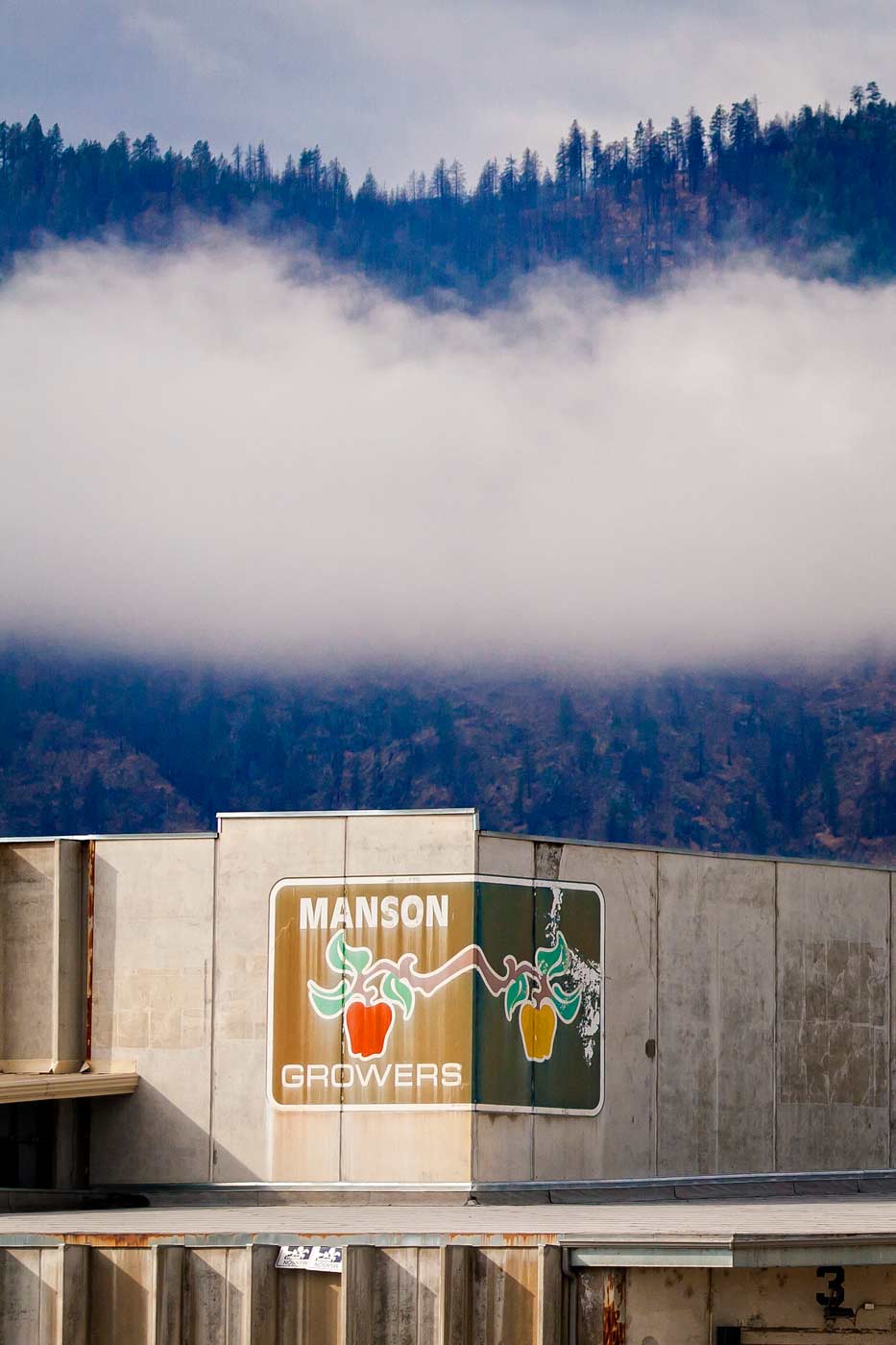
A Manson Growers sign graces the side of the packing warehouse. (Ross Courtney/Good Fruit Grower)
Not all small
Traditionally, cooperatives offer a haven for smaller growers in the era of new varieties and massive volumes, but small is hardly a rule. With roughly 275 growers, Chelan Fruit is one of the largest fresh fruit cooperatives in the world, said Jim Colbert, director of business relations.
The cooperative based in Chelan, Washington, came from several generations of mergers and partnerships of smaller companies. In 2017, Chelan Fruit recruited most of the remaining growers after the Oroville, Washington, cooperative Gold Digger Apples closed, leaving the Canadian border town without one of its largest employers. Privately owned Gebbers Farms of Brewster purchased most of Gold Digger’s facilities, though Chelan Fruit bought one storage building used now as a local receiving house.
Meanwhile, Chelan Fruit is one of the few cooperatives to participate in club varieties, sharing propagation rights of the Sugar Bee apple with Gebbers Farms. Both companies sell fruit through the Chelan Fresh marketing partnership.
Thus, the stereotype of cooperatives is changing. “They don’t operate like the co-ops of old,” said Colbert, also the current chairman of the Washington State Tree Fruit Association based in Yakima.
Still, Chelan Fruit takes smaller growers, as well as large. Many of them have 50 acres or less. Colbert himself owns 30 acres. Some warehouses would not be able to make such small acreage growers pencil out.
History
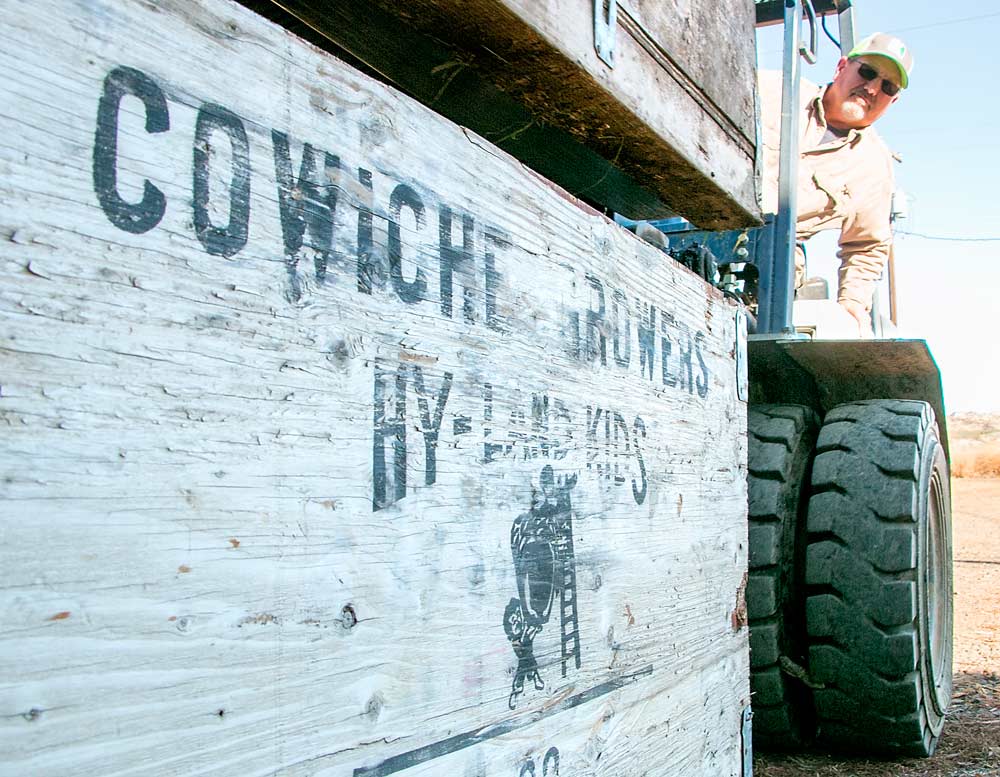
Ron Smith of Cowiche stacks bins of Red Delicious apples in October for his packer, Cowiche Growers. He is new the cooperative after many years packing through a privately owned packing company. (Ross Courtney/Good Fruit Grower)
The U.S. Congress approved agricultural cooperatives with the 1922 passage of the Capper-Volstead Act, which exempted farmers from certain antitrust laws when acting collectively. Cowiche Growers formed the year after that to pack collectively.
Today grower-members use the cooperative model to help themselves navigate other complexities of doing business. For example, about eight years ago, the company launched an effort to comply with Global GAP, a tough sell with many of their older growers, some of who didn’t own a computer at the time.
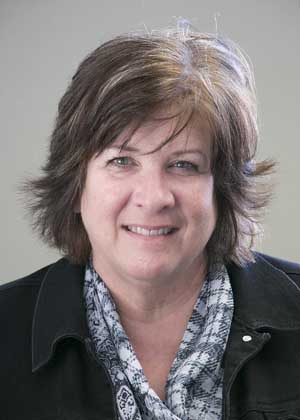
Laurie Knebusch
“The board made the decision that we’re going to support that and drag everybody, kicking and screaming sometimes, but drag them across the finish line,” said Laurie Knebusch, the general manager. The company put together its food safety plan in a book, which other packing companies have since purchased.
Also, Cowiche Growers, Manson Growers and others are discussing how to collectively bring in foreign labor on guest worker visas, something larger farms are doing individually by the thousands.
“I think that’s where we’re going,” said Carlos Lopez, a grower-board member with 140 acres in Cowiche. “I think that’s where everybody is going. And I think as a co-op it will help us because we’re more like a group, so it will be like a group H-2A program.”
Beyond Washington
The cooperative model extends beyond Washington, of course, and beyond packing houses.
Tree Top in Selah, Washington, and Knouse Foods in Peach Glen, Pennsylvania, are two of the largest grower-owned apple processors in the United States. Michigan Cherries is a cooperative processor in Traverse City that represents a large chunk of the state’s tart cherry growers.
More than 1,000 juice grape growers across the nation own the National Grape Cooperative that processes under the brand name Welch’s.
North Bay Produce, also in Traverse City, specializes in marketing fresh fruit and asparagus. They have growers in the nearby Michigan fruit regions and from Chile, Argentina and Guatemala. And, of course, Farm Credit Services is a cooperative for the purposes of financing.
Growers in the Eastern U.S. also have used the cooperative structure to cooperate on marketing, breeding and information-sharing through groups headed by fourth-generation Ohio grower Bill Dodd.
In Ohio, about 12 growers who deliver to seven packing houses are members of the Fruit Growers Marketing Association. It represents about 40 percent of the state’s apples overall, but about 90 percent of the state’s wholesale apples, Dodd said.
That cooperative dates back to 1957, but about 20 ago, Ohio apple growers began pooling money to start a breeding program called the Midwest Apple Improvement Association and later asked Dodd to manage its releases, including the EverCrisp variety.
Meanwhile, in 2012, Dodd began managing the Premier Apple Cooperative, formed in 2000 after an economic study by Cornell University.
It has members from several Eastern apple producing states that gather to swap information on crop size, competing products, shipping issues and pricing — a topic they couldn’t legally discuss without the protection of the Capper-Volstead Act.
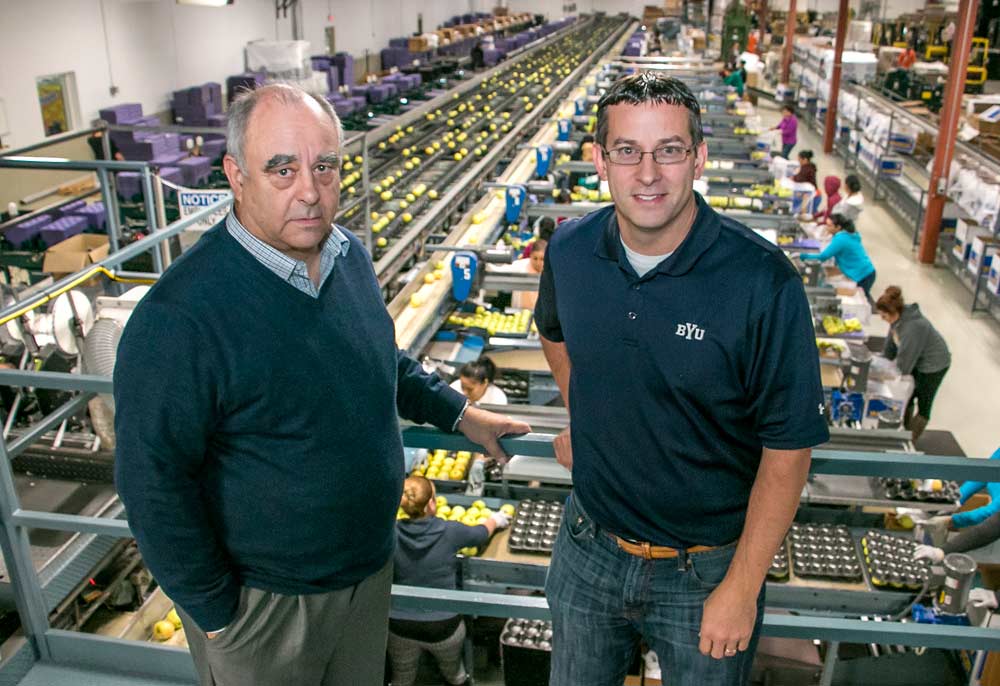
Doug England and his son Jared pose over the packing line at Manson Growers. Doug is the general manager and Jared is the assistant, learning to take the reigns someday. (Ross Courtney/Good Fruit Grower)
Manson Growers
Like Cowiche Growers, Manson Growers is an example of a cooperative plugged into the local, geographic community. About 95 percent of the company’s 80 growers are located around Manson, Washington, a hilly, unincorporated community on the shores of Lake Chelan and a relatively late district.
That attracted Chris Anderson, who farms 22 acres and has been with Manson Growers for 14 years, after 25 years at a larger cooperative outside his area. “For a small grower, this was just a better fit for me,” said Anderson, also a board member.
However, Manson Growers also fancies itself as progressive and nimble, with an eye toward technological improvements and growth, said Doug England, the longtime general manager. Cooperatives have a tendency to operate on slim margins, returning as much money to growers as possible, but warehouses must stay modern in the long-term. “Our growers have enough business sense to understand that,” he said.
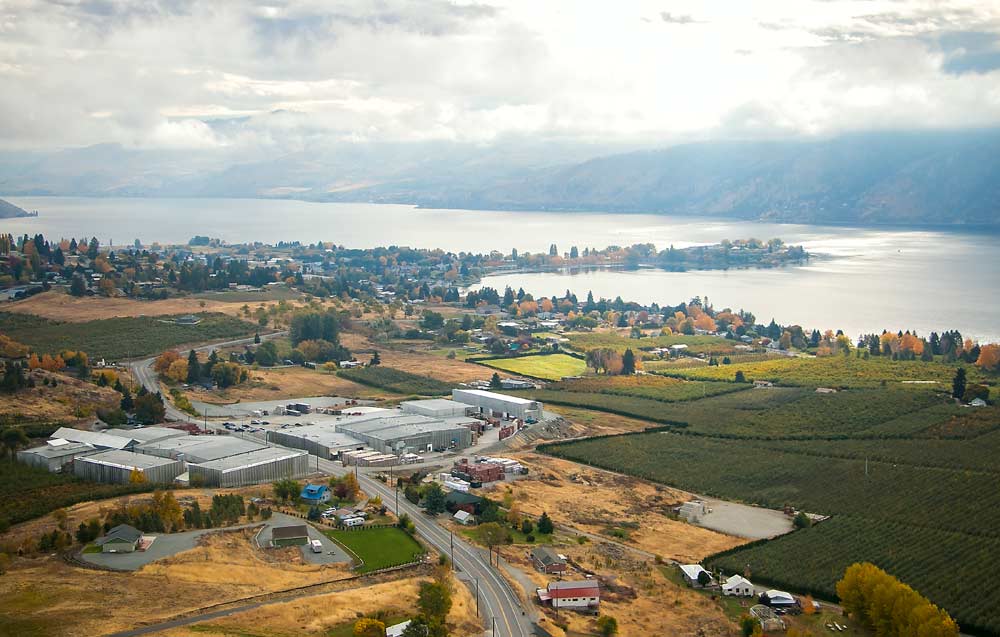
Surrounded by small orchards with traditional varieties, longtime fruit packing cooperative Manson Growers overlooks Lake Chelan in Manson, Washington. Fruit cooperatives often cater to their local growing area, providing the only packing option for small farmers. (Ross Courtney/Good Fruit Grower)
Manson Growers may break the cooperative mold with new ideas, just like Chelan Fruit. The company exports about 80 percent of its fruit, and many of its growers have more than 1,000 acres.
England, who has a master’s degree in horticulture, is retiring later this year and handing the reins to his son Jared, who holds an MBA from Ohio State University and formerly worked in international sales for Victoria’s Secret. The transition has been approved by the board.
“You’d be surprised how much apples have in common with bras and panties in export markets,” Jared said. •
by Ross Courtney






Leave A Comment